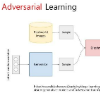Recommendation algorithms typically build models based on historical user-item interactions (e.g., clicks, likes, or ratings) to provide a personalized ranked list of items. These interactions are often distributed unevenly over different groups of items due to varying user preferences. However, we show that recommendation algorithms can inherit or even amplify this imbalanced distribution, leading to unfair recommendations to item groups. Concretely, we formalize the concepts of ranking-based statistical parity and equal opportunity as two measures of fairness in personalized ranking recommendation for item groups. Then, we empirically show that one of the most widely adopted algorithms -- Bayesian Personalized Ranking -- produces unfair recommendations, which motivates our effort to propose the novel fairness-aware personalized ranking model. The debiased model is able to improve the two proposed fairness metrics while preserving recommendation performance. Experiments on three public datasets show strong fairness improvement of the proposed model versus state-of-the-art alternatives. This is paper is an extended and reorganized version of our SIGIR 2020~\cite{zhu2020measuring} paper. In this paper, we re-frame the studied problem as `item recommendation fairness' in personalized ranking recommendation systems, and provide more details about the training process of the proposed model and details of experiment setup.
翻译:建议运算法通常根据历史用户-项目互动(例如,点击、类似或评级)建立模型,以提供个人化的项目排名清单。由于用户偏好不同,这些互动往往在不同的项目类别中分布不均。然而,我们表明,建议算法可以继承甚至扩大这种不平衡分布,从而导致对项目群体提出不公平的建议。具体地说,我们正式确定基于排名的统计均等和平等机会概念,作为项目群体个人化排序建议中的两种公平衡量标准。然后,我们从经验上表明,最广泛采用的一种算法 -- -- 巴伊西亚人化个人化排名法 -- -- 产生了不公平的建议,这促使我们努力提出新的公平意识个人化的排名模式。这种偏差模式能够改进两种拟议的公平性衡量标准,同时保持建议性能。对三个公共数据集的实验表明,拟议的模式相对于最新替代方法的公平性更佳。这是我们SIGIR 2020-cite{zhu20measuring}文件的扩展和重新编排版本。我们在本文件中,重新界定了个人性化的详细程度,将个人化的详细研究问题作为建议集中拟议的个人公平性评议。





